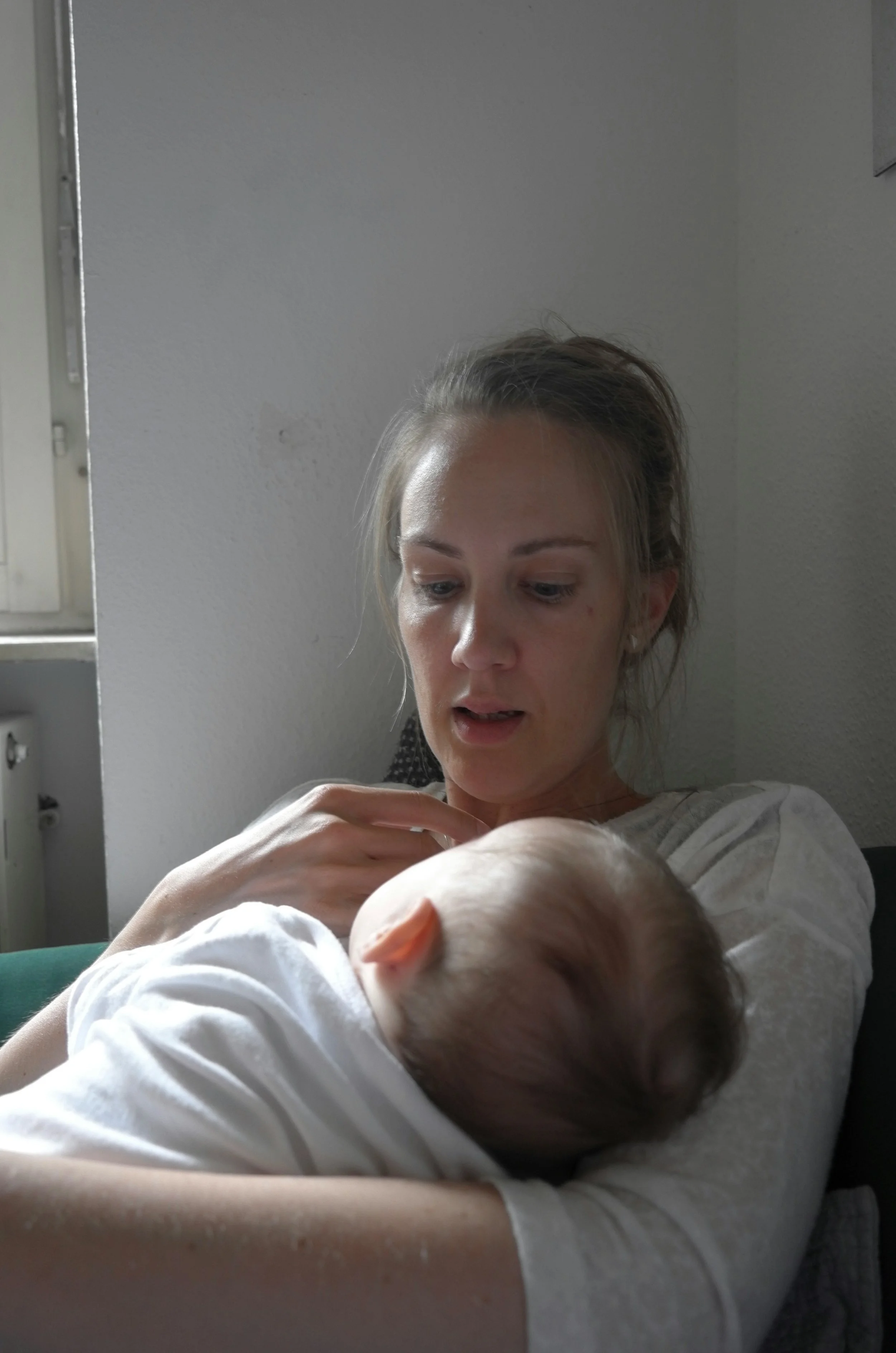Rainbow Baby Day: Honoring Hope and Healing After Loss
Celebrate Rainbow Baby Day with hope and healing. Explore ways to navigate birth trauma, postpartum anxiety, and postpartum support, including EMDR therapy and compassionate care.
You’re Not Broken—You’re a New Mom: Signs You Might Benefit from Postpartum Therapy
Feeling lost after baby? You’re not broken—you’re a new mom. Learn the signs that postpartum therapy can help with anxiety, depression, birth trauma, and emotional overwhelm. Specialized virtual support for moms across California.
I Love My Baby But I’m Struggling: The Most Common Thoughts Moms Don’t Say Out Loud
Struggling with scary or overwhelming thoughts after having a baby? You're not alone. Learn how postpartum therapy can help moms with anxiety, depression, and intrusive thoughts feel safe, seen, and supported.
Accelerate Postpartum Healing: How EMDR Intensives Address Birth Trauma More Effectively Than Traditional Therapy
Explore how EMDR intensives provide rapid relief from birth trauma, offering a comprehensive approach to postpartum healing in California.
EMDR for Birth Trauma: What to Expect from a 1-Day Intensive
Discover how a 1-day EMDR intensive can accelerate healing from birth trauma. Learn what to expect and how this approach supports postpartum therapy in California.
What Is Birth Trauma? Signs You Might Be Overlooking
How EMDR Helps Heal Birth Trauma and Reclaim Your Story
Why Your Birth Was Traumatic Even If Your Baby Is ‘Healthy’
The Shame Trap: Why So Many High-Functioning Moms Hide Their Birth Trauma
Still Haunted by a Difficult Birth? EMDR Intensives Can Help
Struggling after a difficult birth? Learn how EMDR intensives provide fast, effective birth trauma therapy—ideal for moms searching for trauma healing that actually works.
Therapy for Moms Who ‘Have It All’ but Feel Lost
Feeling lost despite a successful life and healthy baby? You’re not alone. Explore compassionate postpartum therapy for high-functioning moms facing anxiety, depression, and emotional overwhelm. Specialized support from a perinatal mental health expert in California.
First-Time Mom Survival Guide (10 of 10): Returning to Work After Baby: How to Make it Suck Less
Returning to work after having a baby is one of the most challenging transitions many new moms face. Whether you're heading back full-time or part-time, the emotional, physical, and logistical adjustments can feel overwhelming. You may be battling a mixture of guilt, anxiety, and excitement — all while trying to figure out how to balance the demands of your career with the needs of your baby.
But here’s the truth: returning to work doesn’t have to be a nightmare. With a bit of planning, self-compassion, and a realistic perspective, you can make this transition smoother for both you and your baby.
First-Time Mom Survival Guide (9 of 10): When to Call a Therapist: Signs You Deserve Support (Hint: It’s Sooner Than You Think)
Becoming a mom for the first time can be a beautiful experience — but it can also be overwhelming, full of challenges, and sometimes downright terrible. Between the emotional rollercoaster of early motherhood, adjusting to your new role, and coping with the physical recovery from childbirth, it’s common to feel exhausted, isolated, and unsure. As much as you may try to handle everything on your own, the truth is, asking for help is not just okay — it’s essential.
First-Time Mom Survival Guide (8 of 10): The Art of Doing Less: Why You Shouldn’t Try to “Bounce Back”
As a new mom, it’s easy to feel the pressure to “bounce back” — to reclaim your pre-pregnancy body, your energy, and your routine as quickly as possible. Social media and mainstream culture often promote this idea of a quick return to “normal,” but the truth is, the postpartum period isn’t about bouncing back — it’s about doing less and giving yourself grace to be exactly where you are.
In this guide, we’ll explore why you should resist the pressure to “bounce back” after giving birth, and how embracing the art of doing less can actually help you heal and thrive during this transformative time.
First-Time Mom Survival Guide (7 of 10): Sleep Solutions for Moms (Not Just Babies)
As a first-time mom, the moment you bring your newborn home, sleep can feel like a distant memory. Between nighttime feedings, diaper changes, and the constant cycle of waking up, your sleep patterns may be completely disrupted. But here’s the thing — your sleep matters too. As a new mom, you’re juggling the physical and emotional demands of motherhood, and getting quality sleep (or at least the best sleep possible) is essential for your well-being.
In this guide, we’ll dive into strategies that not only help your baby sleep better, but also support your sleep and mental health during this demanding time.
First-Time Mom Survival Guide (6 of 10): How to Talk to Your Partner About Postpartum Support
The postpartum period is a time of transition, growth, and change — and it’s not just a shift for you, but also for your partner. As a first-time mom, the changes in your body, emotions, and lifestyle can be overwhelming. It’s easy to feel like everything is suddenly on your shoulders, but you don’t have to go through it alone. Clear communication with your partner about your needs for postpartum support can make all the difference.
First-Time Mom Survival Guide (5 of 10): Creating a Postpartum Care Plan That Prioritizes YOU
The postpartum period is a time of immense change, both physically and emotionally. As you adjust to life with a new baby, it's easy to forget to take care of yourself. You’ve likely spent months focusing on the well-being of your baby, but now is the time to focus on you too. Creating a postpartum care plan that prioritizes your needs is essential for your mental and physical health, as well as for your ability to show up as the mom you want to be.
First-Time Mom Survival Guide (4 of 10): First-Time Mom Must-Haves: Essentials for a Peaceful Postpartum
Becoming a mother for the first time is a seismic shift - the kind that shakes your soul, your schedule, and your sense of self. And, while the internet is full of baby gear checklists and nursery must-haves, what often gets left out is the truth: you are the one who needs the most support. This guide is about building the kind of postpartum experience that honors your healing, your mental health, and your whole humanity.
First-Time Mom Survival Guide (3 of 10): What New Moms Really Need (That No One Talks About)
When you're pregnant, everyone has something to say about what you need - Diaper Genies, Baby Wipe Warmers, the "perfect" stroller… But, once the baby arrives, the things you truly need—the ones that don’t fit in an Amazon box—are nowhere on the registry. In Blog 3 of 10 of the First-Time mom survival series, we’ll talk about what really matters: the emotional and psychological essentials that can make or break a new mother’s postpartum experience.
First-Time Mom Survival Guide (2 of 10): How to Protect Your Mental Health in the Fourth Trimester
The fourth trimester — the first three months after birth — is often a time of intense change, adjustment, and self-discovery for new moms. This is a time when many new moms experience overwhelming feelings, anxiety, or sadness. The physical and emotional recovery after childbirth can be a lot to navigate, but with the right support and coping strategies, you can protect and nurture your mental health. In the second blog in the First-Time Mom Survival Guide Series, we’ll explore practical ways to prioritize your postpartum mental health the fourth trimester so that you can thrive.





















